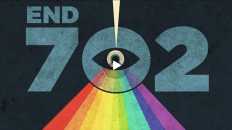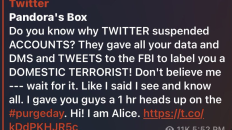ForbiddenKnowledgeTV
Alexandra Bruce
October 6, 2014
For everyone who was blocked out of this morning’s Saturday Night Live sketch, “Whites,” I offer my apologies. There is no indication on YouTube, whether a given post will be blocked somewhere – moreover it’s not clear who is doing the blocking in any case: The uploader, the copyright owner or the receiving ISP? The code I used was obtained from the official Saturday Night Live YouTube user account, so it’s likely that they did the foreign territory blocking, because their show is broadcast in the US and they might think there is no use promoting their show for free on YouTube? Maybe it’s NBC’s policy. I frankly don’t know.
Since the first two complaints I received came from both Greece and then Canada, I had to assume that this clip was likely blocked everywhere outside of the US.
And since at least 40% of my viewers are not in the US, this was unacceptable to me, so after scheduling tonight’s program, which I hope will be available everywhere (except for the usual suspects, over which I have no control), I stumbled upon this fascinating post about “Professional Trolls” posted on a YouTube user account called “China Uncensored.”
China Uncensored aims, in their own words to be a China news service, in the same way that “the Daily Show or Colbert Report is US news. It’s a little funny, a little scary, and pretty darn entertaining. Host, Chris Chappell launches his war on the CCP with a sarcastic take on China’s government abuse with the latest news.”
With China’s domestic policies in the news so much, over the past week, I though this was relevant – and it also opened up an unexpected massive can of worms.
China Uncensored’s story this week included a dig at the so-called “50 Cent Brigade” aka the “50 Cent Party”, who are essentially, professional trolls. It’s their job to trawl through websites, both inside and outside of China, and monitor what the public is saying about the current regime and draw the conversation away from anything critical of China by instead criticizing the United States, Western involvement in international affairs, or by pointing out the flaws of democracy. Naturally, the China Uncensored account gets plenty of these guys, which may be ironic since YouTube, along with Facebook and Twitter are actually banned in China.
In fact, China employs 2 million of Internet monitors, more than the 1.5 million troops in the world’s largest standing Army; the People’s Liberation Army.
The 50 Cent Brigade is clearly a new form of cyber warfare. The weapons are not hacking or viruses, but a careful and systematic propaganda push.
We know this from the following leaked propaganda directive which was created for professional Chinese trolls to follow:
1. To the extent possible, make America the target of criticism. Play down the existence of Taiwan.
2. Do not directly confront the [idea of] democracy; rather, frame the argument in terms of “what kind of system can truly implement democracy?”
3. To the extent possible, choose various examples in Western countries of violence and unreasonable circumstances to explain how democracy is not well-suited to capitalism.
4. Use America’s and other countries’ interference in other countries to explain how Western democracy is actually an invasion of other countries and [how the West] is forcibly pushing [on other countries] Western values.
5. Use the bloody and tear-stained history of a [once] weak people [i.e., China] to stir up pro-Party and patriotic emotions.
6. Increase the exposure that positive developments inside China receive; further accommodate the work of maintaining [social] stability.
Chinese Internet users are very smart and work their way around censorship by using coded language and they are quite aware of the trolls in their midst – probably more so than their Western counterparts.
In Chinese, trolling is referred to as “bai mu” (literally: “white eye”), which can be straightforwardly explained as “eyes without pupils”, in the sense that whilst the pupil of the eye is used for vision, the white section of the eye cannot see, and trolling involves blindly talking nonsense over the Internet, having total disregard to sensitivities or being oblivious to the situation at hand, akin to having eyes without pupils.
An alternative term is “bai lan” (literally: “white rot”), which describes a post completely nonsensical and foolish, made to upset others. It derives from a Taiwanese slang term for the male genitalia, where genitalia that is pale white in colour represents that someone is young, and thus foolish. Both terms originate from Taiwan, and are also used in Hong Kong and mainland China. Another term, “xiao bai” (literally: “little white”) is a derogatory term that refers to both “bai mu” and “bai lan” that is used on anonymous posting internet forums. Another common term for a troll used in mainland China is pen zi (literally: “squirt”).
As you can see, code words and wordplay are very much alive in Chinese Internet culture.
As I was researching this article, to look into the countries with the most highly censored, filtered or controlled Internet, I was somewhat surprised – (but then not) to find that the practice is widespread among not just the ‘usual suspects’ of China, Pakistan, Iran and Saudi Arabia but among countries who like to bandy the word ‘freedom’ about, with a total lack of discernment as to what the word actually means.
The OpenNet Initiative (ONI) classifies the magnitude of censorship or filtering occurring in a country in four areas of activity:
– *Pervasive*: A large portion of content in several categories is blocked.
– *Substantial*: A number of categories are subject to a medium level of filtering or many categories are subject to a low level of filtering.
– *Selective*: A small number of specific sites are blocked or filtering targets a small number of categories or issues.
– *Suspected*: It is suspected, but not confirmed, that Web sites are being blocked.
– *No evidence*: No evidence of blocked Web sites, although other forms of controls may exist.
Other countries where control of the Internet was described as being as “Pervasive” as the known offenders mentioned above, in terms of censorship and control, included the US, UK, Russia, India, both Koreas the remaining countries of the Arabian Peninsula, the two Sudans and Ethiopia, along with most of the Muslim-dominant countries in Central Asia, a few of these somewhat less tightly-controlled but with Indonesia being “Substantial” although not rising to the “Pervasive” level of the most paranoid States.
The areas of the world which had the least amount of Internet censorship included Canada, Mexico and all of South America, except Peru and Guyana (formerly British Guiana) which were described as “a changing situation” (aka “Suspected”) and with Colombia’s level of censorship described as “Selective.”
Most of Africa has a free Internet. The countries practicing the same “Selective” level of monitoring as that practiced in Colombia included Western Sahara, Mauritania, Mali and Libya, Italy, Turkey, Kazakhstan, Turkmenistan, Uzbekistan, Kyrgyzstan, Thailand and Myanmar.
Other countries, like Peru, described as “Changing” (or “Suspected”) included France, Tunisia, Angola, Egypt, Malaysia and Australia.
In Asia, pockets of Internet freedom were found in Japan, the Philippines, Papua New Guinea, Mongolia, Nepal, Bangladesh, Afghanistan and Iraq (oddly enough).
In Europe, the Internet is also open, including Ukraine – but not Belarus, which is as tightly-controlled as neighboring Russia and as noted before, the not-so-neighboring UK, France’s situation “Changing,” i.e., “Suspected” and Italy’s monitoring being “Selective”.
There are other reporting agencies, which also monitor Internet monitoring, including Freedom on the Net and Reporters without Borders (RWB) who refer to the top offenders such as the US, UK, China and Russia as “Enemies of the Internet”.
There’s a very interesting article about this published here:












Add comment